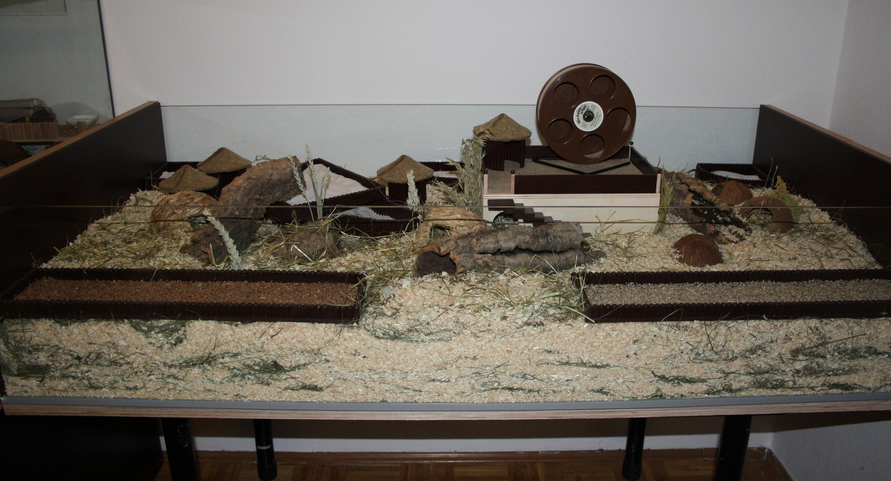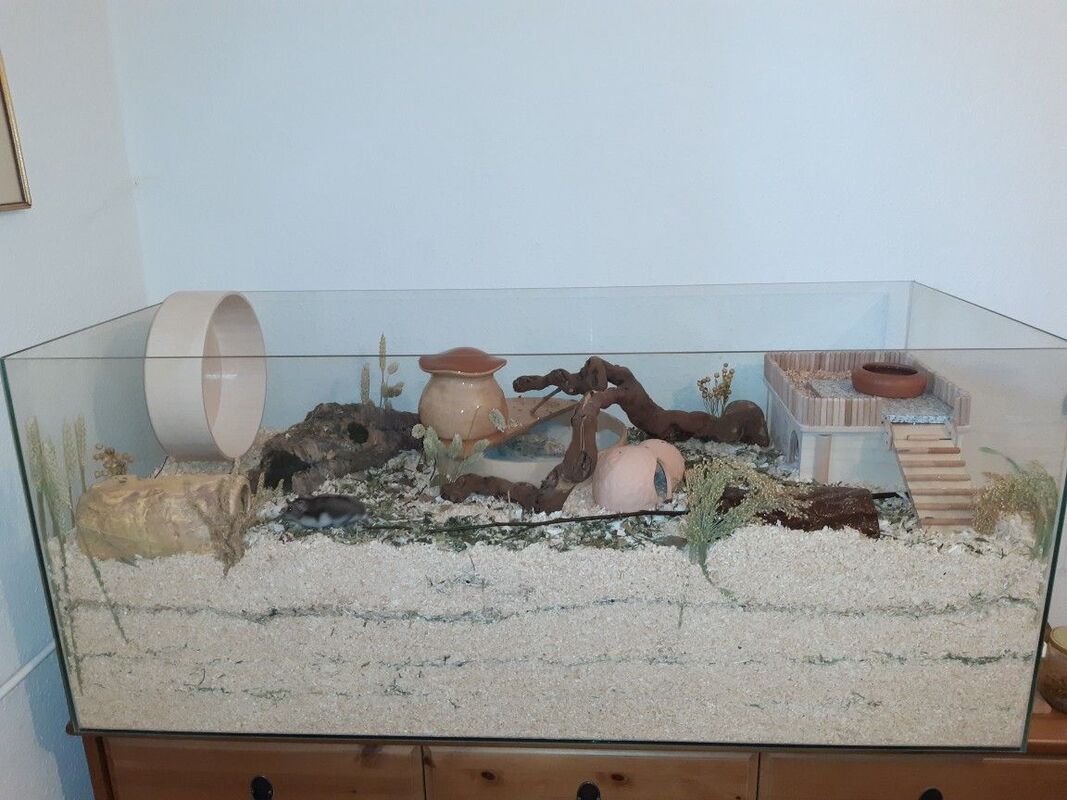General information:
Syrian hamsters are the largest breed of domesticated hamsters. They’re also informally referred to as teddy bear hamsters, golden hamsters, and fancy hamsters.
As their name suggests, they can be found in Syria, but they can be found in southern Turkey and Israel too. In the wild, they’re classed as a vulnerable species due to loss of habitat. They’d previously been thought to be extinct in the wild up until 1997 and 1999 when there were several sightings on expeditions.
One of the Syrian hamsters most infamous characteristics is their expandable cheek pouches which extend down to their shoulders and are used to transport large amounts of food to their burrows.
Despite popular belief, wild Syrian hamsters exhibit crepuscular activity patterns rather than nocturnal behaviours. They have a general lifespan of 2-2.5 years in captivity but can live to roughly 3 years.
Care:
Housing/Enrichment:
Cage size should be a minimum of W 50cm x L 100cm of unbroken floor space.
Their cage should have a deep base to allow a generous layer of a suitable substrate so your hamster can burrow.
Syrian hamsters can live in cages with bars, or in converted tanks. Barred cages allow one-to-one interaction whilst your hamster remains in the cage, although, bar-chewing is a common problem and shouldn't be tolerated. If your hamster is a relentless bar-chewer, try upgrading their cage, providing more toys, and allowing more out-of-the-cage playtime. Failing that, consider moving your hamster into a tank.
Syrian hamsters require a large solid floor wheel approximately 28cm in diameter. You can also provide large flying saucers marketed for Chinchillas.
Consider toys such as houses, sand baths, tunnels, and bridges for your hamster to utilize.
Suitable temperatures are approximately 20-22°C and humidity should be approximately 40-60%. Hamsters are permissive hibernators and at temperatures around 4c may enter torpor.
Syrian hamsters are the largest breed of domesticated hamsters. They’re also informally referred to as teddy bear hamsters, golden hamsters, and fancy hamsters.
As their name suggests, they can be found in Syria, but they can be found in southern Turkey and Israel too. In the wild, they’re classed as a vulnerable species due to loss of habitat. They’d previously been thought to be extinct in the wild up until 1997 and 1999 when there were several sightings on expeditions.
One of the Syrian hamsters most infamous characteristics is their expandable cheek pouches which extend down to their shoulders and are used to transport large amounts of food to their burrows.
Despite popular belief, wild Syrian hamsters exhibit crepuscular activity patterns rather than nocturnal behaviours. They have a general lifespan of 2-2.5 years in captivity but can live to roughly 3 years.
Care:
Housing/Enrichment:
Cage size should be a minimum of W 50cm x L 100cm of unbroken floor space.
Their cage should have a deep base to allow a generous layer of a suitable substrate so your hamster can burrow.
Syrian hamsters can live in cages with bars, or in converted tanks. Barred cages allow one-to-one interaction whilst your hamster remains in the cage, although, bar-chewing is a common problem and shouldn't be tolerated. If your hamster is a relentless bar-chewer, try upgrading their cage, providing more toys, and allowing more out-of-the-cage playtime. Failing that, consider moving your hamster into a tank.
Syrian hamsters require a large solid floor wheel approximately 28cm in diameter. You can also provide large flying saucers marketed for Chinchillas.
Consider toys such as houses, sand baths, tunnels, and bridges for your hamster to utilize.
Suitable temperatures are approximately 20-22°C and humidity should be approximately 40-60%. Hamsters are permissive hibernators and at temperatures around 4c may enter torpor.
Socialising:
Syrian hamsters are strictly solitary. Under no circumstances should you house two Syrian hamsters together within the same cage, and they should never be allowed to play together outside of the cage. In the wild, they will live alone within their burrows.
Given their extremely territorial nature, two Syrian hamsters will often fight to the death when housed together.
Unfortunately, Syrian hamsters, like most hamsters, have a reputation for being ‘nippy’. Multiple factors such as improper housing, rough handling, poor genes, personality, age, and history contribute to antisocial behaviour.
Often, hamsters are friendly provided they have a happy home and frequent interaction with a confident handler.
Diet:
As an omnivorous species, Syrian hamsters require both plant and meat-based material. There is a wide variety of commercial hamster foods readily available in stores and online, but many are entirely unsuitable. Syrian hamsters, like most hamsters, are prone to selective feeding - particularly if over fed. We've found if fed proper amounts and a good tasty mix of high quality ingredients for them to forage with, hamsters can do well on a mix. We do, however, still offer some pelleted foods too.
Aim for foods containing:
Useful Links:
Please feel free to ask more questions.
Syrian hamsters are strictly solitary. Under no circumstances should you house two Syrian hamsters together within the same cage, and they should never be allowed to play together outside of the cage. In the wild, they will live alone within their burrows.
Given their extremely territorial nature, two Syrian hamsters will often fight to the death when housed together.
Unfortunately, Syrian hamsters, like most hamsters, have a reputation for being ‘nippy’. Multiple factors such as improper housing, rough handling, poor genes, personality, age, and history contribute to antisocial behaviour.
Often, hamsters are friendly provided they have a happy home and frequent interaction with a confident handler.
Diet:
As an omnivorous species, Syrian hamsters require both plant and meat-based material. There is a wide variety of commercial hamster foods readily available in stores and online, but many are entirely unsuitable. Syrian hamsters, like most hamsters, are prone to selective feeding - particularly if over fed. We've found if fed proper amounts and a good tasty mix of high quality ingredients for them to forage with, hamsters can do well on a mix. We do, however, still offer some pelleted foods too.
Aim for foods containing:
- 18% protein
- 15% fibre
- Less than 10% fat
Useful Links:
- www.vetsend.co.uk/bunny-nature-hamster-dream-expert/
- www.rodipet.co.uk/pet-foods/rodipet-organic-syrian-hamster-food-junior-500g.html
- ratrations.co.uk/hamster
- www.viovet.co.uk/Supreme-Science-Selective-Hamster-Food/c1095/?quick_find=112946&utm_source=sag&utm_medium=organic&utm_campaign=surfaces_UK&gclid=Cj0KCQjwub-HBhCyARIsAPctr7yxn99wdmux8rQiZSMWxqYQQkAE9nwOcUf7KEXQamTRWOXmoUpIEh4aArTKEALw_wcB
Please feel free to ask more questions.


